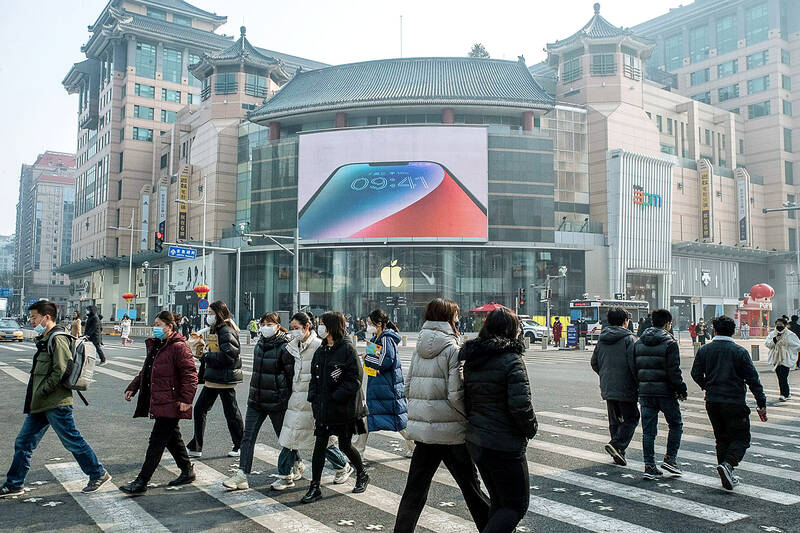Apple Inc and Oppo Mobile Telecommunications Corp (歐珀) were the top smartphone makers in China in the first quarter this year, in a market that is still shrinking following a year of economic disruptions.
Shenzhen-based Oppo had the biggest share of shipments, at 19.6 percent, IDC data showed, with Apple’s iPhone following close behind.
Counterpoint and Canalys estimates, which look at sales and shipments, handed Apple the narrow lead.

Photo: Bloomberg
The US electronics firm clinched the top spot in the final three months of last year following the release of its iPhone 14 and 14 Pro series.
The Chinese smartphone market registered double-digit contractions for most of the past year, first with steep drops in sales of Android handsets, such as those made by Oppo, and eventually affecting even Apple’s iPhone range.
Shipments to China excluding Hong Kong and Macau declined 11 percent in the first quarter from a year earlier to the lowest first-quarter levels in a decade, Canalys said.
Price cuts of iPhone 14 Pro and Pro Max models helped in February, IDC said, although the introduction of a new yellow iPhone 14 handset failed to stir major excitement.
Apple debuted the new color option early last month hoping to keep buyers interested in the pricey device, which costs at least 5,999 yuan (US$866) in China.
Oppo sold more premium devices than expected in the past quarter, IDC said.
It got a boost from its sub-brand OnePlus returning to the domestic market, along with a positive reception to its foldable devices.
Samsung Electronics Co, the global leader in smartphones and foldables, has only a small presence in China, where every local phone maker now has at least one foldable model on sale.
None of the top five biggest vendors in China recorded positive growth.
Vivo, Honor Mobile (榮耀) and Xiaomi Corp (小米) rounded out the leading brands, each with significant declines on the same period last year.
Smartphone production is down 13.8 percent in the world’s second-largest economy this year, despite a rebound in the overall economy, official data showed.
“The [COVID-19] pandemic affected consumer behavior in the medium to long term, where consumers tended to spend their income on necessities and maintain certain savings,” Canalys analyst Lucas Zhong said in a report yesterday. “Vendors need to offer convincing products to stimulate upgrades.”

Taiwan’s long-term economic competitiveness will hinge not only on national champions like Taiwan Semiconductor Manufacturing Co. (TSMC, 台積電) but also on the widespread adoption of artificial intelligence (AI) and other emerging technologies, a US-based scholar has said. At a lecture in Taipei on Tuesday, Jeffrey Ding, assistant professor of political science at the George Washington University and author of "Technology and the Rise of Great Powers," argued that historical experience shows that general-purpose technologies (GPTs) — such as electricity, computers and now AI — shape long-term economic advantages through their diffusion across the broader economy. "What really matters is not who pioneers

In a high-security Shenzhen laboratory, Chinese scientists have built what Washington has spent years trying to prevent: a prototype of a machine capable of producing the cutting-edge semiconductor chips that power artificial intelligence (AI), smartphones and weapons central to Western military dominance, Reuters has learned. Completed early this year and undergoing testing, the prototype fills nearly an entire factory floor. It was built by a team of former engineers from Dutch semiconductor giant ASML who reverse-engineered the company’s extreme ultraviolet lithography (EUV) machines, according to two people with knowledge of the project. EUV machines sit at the heart of a technological Cold

TAIWAN VALUE CHAIN: Foxtron is to fully own Luxgen following the transaction and it plans to launch a new electric model, the Foxtron Bria, in Taiwan next year Yulon Motor Co (裕隆汽車) yesterday said that its board of directors approved the disposal of its electric vehicle (EV) unit, Luxgen Motor Co (納智捷汽車), to Foxtron Vehicle Technologies Co (鴻華先進) for NT$787.6 million (US$24.98 million). Foxtron, a half-half joint venture between Yulon affiliate Hua-Chuang Automobile Information Technical Center Co (華創車電) and Hon Hai Precision Industry Co (鴻海精密), expects to wrap up the deal in the first quarter of next year. Foxtron would fully own Luxgen following the transaction, including five car distributing companies, outlets and all employees. The deal is subject to the approval of the Fair Trade Commission, Foxtron said. “Foxtron will be

INFLATION CONSIDERATION: The BOJ governor said that it would ‘keep making appropriate decisions’ and would adjust depending on the economy and prices The Bank of Japan (BOJ) yesterday raised its benchmark interest rate to the highest in 30 years and said more increases are in the pipeline if conditions allow, in a sign of growing conviction that it can attain the stable inflation target it has pursued for more than a decade. Bank of Japan Governor Kazuo Ueda’s policy board increased the rate by 0.2 percentage points to 0.75 percent, in a unanimous decision, the bank said in a statement. The central bank cited the rising likelihood of its economic outlook being realized. The rate change was expected by all 50 economists surveyed by Bloomberg. The